Describe acinus structure - Study guides, Class notes & Summaries
Looking for the best study guides, study notes and summaries about Describe acinus structure? On this page you'll find 14 study documents about Describe acinus structure.
All 14 results
Sort by
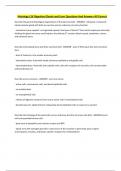
-
Histology L26 Digestive Glands and Liver Questions And Answers All Correct
- Exam (elaborations) • 6 pages • 2024
-
- $15.99
- + learn more
Histology L26 Digestive Glands and Liver Questions And Answers All Correct Describe the general histological organization of the pancreas (LO) - ANSWER-- lobulated, compound, tubulo-alveolar gland with both an exocrine and an endocrine secretory function - connective tissue support: no organized capsule; thin layer of loose CT from which septa pass internally dividing the gland into many small lobules; the delicate CT contains blood vessels, lymphatics, nerves, and excretory ducts Descr...

-
Histology L26 Digestive Glands and Liver Questions And Answers All Correct
- Exam (elaborations) • 6 pages • 2024
-
- $12.99
- + learn more
Histology L26 Digestive Glands and Liver Questions And Answers All Correct Describe the general histological organization of the pancreas (LO) - ANSWER-- lobulated, compound, tubulo-alveolar gland with both an exocrine and an endocrine secretory function - connective tissue support: no organized capsule; thin layer of loose CT from which septa pass internally dividing the gland into many small lobules; the delicate CT contains blood vessels, lymphatics, nerves, and excretory ducts Descr...
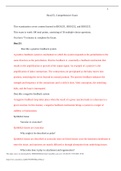
-
BIOS 255 Week 8 Comprehensive Exam (50 MCQs) | 100% CORRECT ANSWERS
- Exam (elaborations) • 7 pages • 2022
- Available in package deal
-
- $12.49
- 7x sold
- + learn more
Bios255, Comprehensive Exam This examination covers content learned in BIOS251, BIOS252, and BIOS255. This exam is worth 100 total points, consisting of 50 multiple-choice questions. You have 75 minutes to complete the Exam. Bios251 Describe a positive feedback system A positive feedback system is mechanism in which the system responds to the perturbation in the same direction as the perturbation. Positive feedback is essentially a feedback mechanism that results in the amplification or growth o...
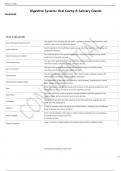
-
Digestive System: Oral Cavity & Salivary Glands Terms in this set (45) What is the gastrointestinal tract? The digestive tract including the oral cavity, esophagus, stomach, small intestine, large intestine, anal canal, and associated glands Saliv
- Exam (elaborations) • 3 pages • 2024
-
- $9.99
- + learn more
Digestive System: Oral Cavity & Salivary Glands Terms in this set (45) What is the gastrointestinal tract? The digestive tract including the oral cavity, esophagus, stomach, small intestine, large intestine, anal canal, and associated glands Salivary Glands Exocrine glands in the mouth that produce saliva, which has digestive, lubricating, and protective functions Tunica mucosa and its layers The innermost layer of the gastrointestinal tract, consisting of epithelial lining, la...
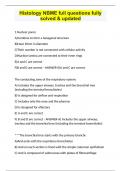
-
Histology NBME full questions fully solved & updated
- Exam (elaborations) • 131 pages • 2024
-
- $7.99
- + learn more
1.Nuclear pores: A)Combine to form a hexagonal structure B)Have 50nm in diameter C)Their number is not connected with cellular activity D)Nuclear lamina are connected to their inner rings E)A and C are correct F)B and D are correct - ANSWER-E)A and C are correct The conducting zone of the respiratory system: A) Includes the upper airways, trachea and the bronchial tree (including the terminal bronchioles) B) Is designed for airflow and respiration C) Includes only the nose and the ph...
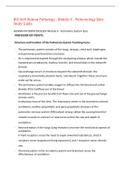
-
BIO 669 Human Pathology - Module 6 - Pulmonology Quiz Study Guide,100% CORRECT
- Exam (elaborations) • 61 pages • 2022
-
- $15.99
- + learn more
BIO 669 Human Pathology - Module 6 - Pulmonology Quiz Study Guide HUMAN PATHOPHYSIOLOGY Module 6 - Pulmonary System Quiz PROFESSOR KEY POINTS: Structure and Function of the Pulmonary System Teaching Focus • The pulmonary system consists of the lungs, airways, chest wall, diaphragm, and pulmonary and bronchial circulation. • Air is inspired and expired through the conducting airways, which include the nasopharynx, oropharynx, trachea, bronchi, and bronchioles to the sixteenth divis...
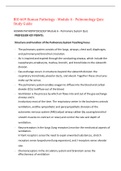
-
BIO 669 Human Pathology - Module 6 - Pulmonology Quiz Study Guide,100% CORRECT
- Exam (elaborations) • 61 pages • 2022
-
- $15.49
- + learn more
BIO 669 Human Pathology - Module 6 - Pulmonology Quiz Study Guide HUMAN PATHOPHYSIOLOGY Module 6 - Pulmonary System Quiz PROFESSOR KEY POINTS: Structure and Function of the Pulmonary System Teaching Focus • The pulmonary system consists of the lungs, airways, chest wall, diaphragm, and pulmonary and bronchial circulation. • Air is inspired and expired through the conducting airways, which include the nasopharynx, oropharynx, trachea, bronchi, and bronchioles to the sixteenth divis...

-
Pathophysiology Exam Test #3 Part 1 and 2 Completed with 100% correct Answers
- Exam (elaborations) • 36 pages • 2022
- Available in package deal
-
- $15.60
- + learn more
Pathophysiology Exam Test #3 Part 1 and 2 Completed with 100% correct Answers Pathophysiology Exam Test #3 Part 1 and 2 Patho Test #3 part 2 When discussing body fluid, it is correct to state that: A: two-thirds of the body's water is intracellular. B: one-fourth of the body's fluid is extracellular. C: the two main extracellular compartments are interstitial and intracellular. D: standard total body water is 40% of body weight. A: two-thirds of the body's water is intracellular. ...
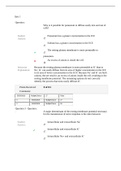
-
NSG 5003 Questions and Answers_Latest,100% CORRECT
- Exam (elaborations) • 42 pages • 2021
-
- $19.47
- + learn more
NSG 5003 Questions and Answers_Latest Quiz 1 Question : Why is it possible for potassium to diffuse easily into and out of cells? Student Answer: Potassium has a greater concentration in the ICF. Sodium has a greater concentration in the ECF. The resting plasma membrane is more permeable to potassium. An excess of anions is inside the cell. Instructor Explanation: Because the resting plasma membrane is more permeable to K+ than to Na+, K+ can easily diffuse from its area of higher concentration ...
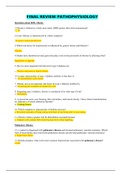
-
FINAL REVIEW PATHOPHYSIOLOGY--latest
- Exam (elaborations) • 18 pages • 2021
- Available in package deal
-
- $6.49
- + learn more
FINAL REVIEW PATHOPHYSIOLOGY Questions about BMI, Obesity 1-Obesity is defined as a body mass index (BMI) greater than what measurement? d. 30 2-Cystic fibrosis is characterized by which symptom? Excessive mucus production 3-Which risk factor for hypertension is influenced by genetic factors and lifestyle? Obesity. 4-Studies have identified several genes that play a role in the prevention of obesity by affecting what? Regulation of appetite 5-The two most important ...

Study stress? For sellers on Stuvia, these are actually golden times. KA-CHING! Earn from your study resources too and start uploading now. Discover all about earning on Stuvia


